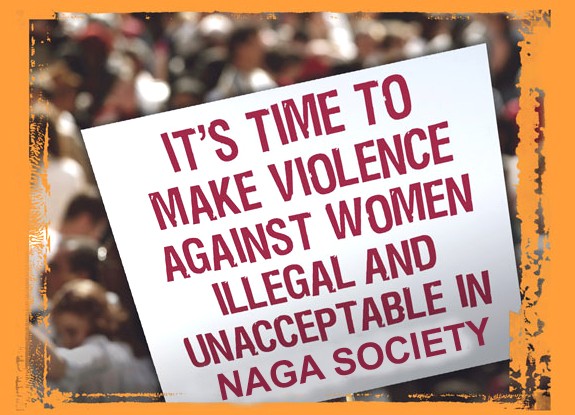
Y Merina Chishi
Dimapur| November 24
Across the world, violence against women and girls continue unabated despite efforts to curb such violence, by all societies. Irrespective of colour, age, culture and language, violence and injustice have crept into every society, and among Nagas, these realities don’t seem to have a hiding place any longer.
Today is ‘International Day for Elimination of Violence against Women,’ a day to rise public awareness of the malady of violence against women. Many Naga women are of the view that gender inequality is a stark truth and this has played down the role of women in the Naga society. Most observers say violence and discrimination is more prevalent in middle and lower-class societies, and the fact is a majority of Nagas belong to these categories. According to informal reports, domestic violence and human trafficking are the two serious areas of concerns for Nagas today. Domestic violence, something not many people bring out in the open is leading to gross violation of human rights. A lawyer said that basic civil right is under serious threat and the Naga “customary law” has little or no provision to protect women’s rights in regard to domestic violence. Most cases of domestic violence do not even reach the doors of the guardians of civil rights, the lawyer added.
Violence has also become a major cause of death, physical and mental disability among many Naga women today, a doctor said. He has had women patients come in with problems which they try to give explanation for, the doctor said and added, “A doctor can differentiate a fall in the bathroom and one of being hit.”
Over the last few years, human trafficking has become an organized business in Nagaland. Non-governmental organizations working in this area say that even in this business, women and girls are more vulnerable targets. It is a trend to “adopt” girls preferably because they are more useful for manual work, an NGO worker said. Proven that most women and girls trafficked are from lower-income groups, many observers believe poverty is the influential factor for the rise in human trafficking. Unless the government addresses the core issue of eradicating poverty, human trafficking will never be curbed, the NGO worker said.
Sexual violence is probably the most heinous crime which is often covered up. Recent cases of rape and murder of women across the state, including commercial sex workers (CSW) have raised the bar of crime to another level, observers feel. There have been reports of CSWs being raped, murdered in the most brutal manner and their bodies disposed in the Assam-Nagaland border. Studies also show women who are abused physically by partners are more vulnerable to HIV/AIDS. A doctor working with UNAIDS said violence and HIV can be a deadly combination, doubling the risk of spreading the virus. Also the inability of women to say “no” to their partners have led to brutal forms of human rights violations and making the women population in Nagaland more vulnerable to HIV/AIDS, the doctor said. The fear and stigma attached to the virus has also prevented many women from seeking redress thus taking the virus to a pandemic level, another doctor observed. There have also been reports of crimes against women in situations of armed conflicts, though many fear to speak about it. CSWs in Dimapur are reported to be picked up at gun points with no one to question the perpetrators.
The picture is clear but there is still little awareness, a former women tribal hoho president said. There is a need for advocacy among women and seriously address the issue of human rights in Nagaland, she said. She added that in a society where violence and injustice prevails, there is something seriously wrong and women are always more vulnerable to such situations. The role of the State Women Commission is also under criticism for being a mere “watchdog” in Nagaland. NGO workers and interestingly many Naga men believe the women commission should play a more proactive role and address issues of violence and human right abuse in Nagaland.






